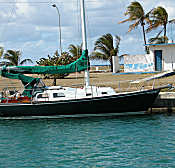
ABOVE: Marina Hemingway, Cuba
In 2003 Michele Geslin and Peter Goldsmith, residents of the Conch Republic, otherwise known as Key West, organized the Conch Republic Regatta, a sailboat race between Key West and the Marina Hemingway outside Havana, Cuba. The organizers traveled on two boats owned by participants. The day after their return they were dragged from their bedrooms in their pajamas and indicted on charges that they violated the Trading with the Enemy Act and, more specifically, 31 C.F.R. 515.572(a)(1), which prohibits, among other things, the provision of unlicensed travel services to Cuba.
Judge James Lawrence King was not amused and dismissed the indictment, noting that the provisions of section 515.572(a)(1) were not violated by independent coordinated travel to Cuba where the defendants didn’t provide the travel or provide lodging in Cuba. In the case of the regatta, the sailors traveled to Cuba on their own boats, not on boats provided or arranged by the defendants. The court further noted that none of the regatta fees collected by the defendants were spent in Cuba and that the indictment did not allege any expenditures in Cuba or other financial benefit to Cuba.
Four years later, in December 2007, the Bureau of Industry and Security (“BIS”) decided not to let bygones be bygones and issued a charging letter accusing Geslin and Goldsmith of aiding and abetting the unlicensed temporary export of two vessels in the regatta to Cuba. Geslin and Goldsmith, thinking no doubt that the dismissal of the indictment settled the matter, sent letters to BIS contesting the charges but participated no further in the proceeding.
In particular, the two failed two respond to requests for admissions filed by BIS, so the Administrative Law Judge (“ALJ”) assigned to BIS’s case deemed that all the requested admissions had been admitted and entered summary judgment against Geslin and Goldsmith. On November 4, BIS entered an order, just published in its website, imposing and $11,000 fine against the two as well as a conditional denial of export privileges that would not go into effect if Geslin and Goldsmith paid the fines in a timely fashion.
It does not appear that any of the boat owners was fined or prosecuted for the export of the boats to Cuba. Rather only the regatta organizers were fined by BIS for “aiding and abetting” the export. The charging letter and the ALJ decision make much of the fact that the duo rode the boats to Cuba but there is no evidence that they raised a spinnaker, took control of the rudder, or otherwise did anything but sit on their keisters during the brief voyage between Key West and Havana. The regatta fees that they collected were all spent in Key West and so also don’t serve as much of a basis for an “aiding and abetting” charge. At most, they publicized and coordinated the regatta, activities that Judge King said didn’t constitute provision of travel services. Perhaps that is alone enough to be seen as aiding and abetting, but you have to wonder whether BIS doesn’t have more compelling things to do than to carry on a grudge match against two regatta organizers, particularly where the boat owners were apparently allowed to sail off into the sunset.
 Permalink
Permalink
Copyright © 2008 Clif Burns. All Rights Reserved.
(No republication, syndication or use permitted without my consent.)

 Posted by
Posted by  Category:
Category: 

